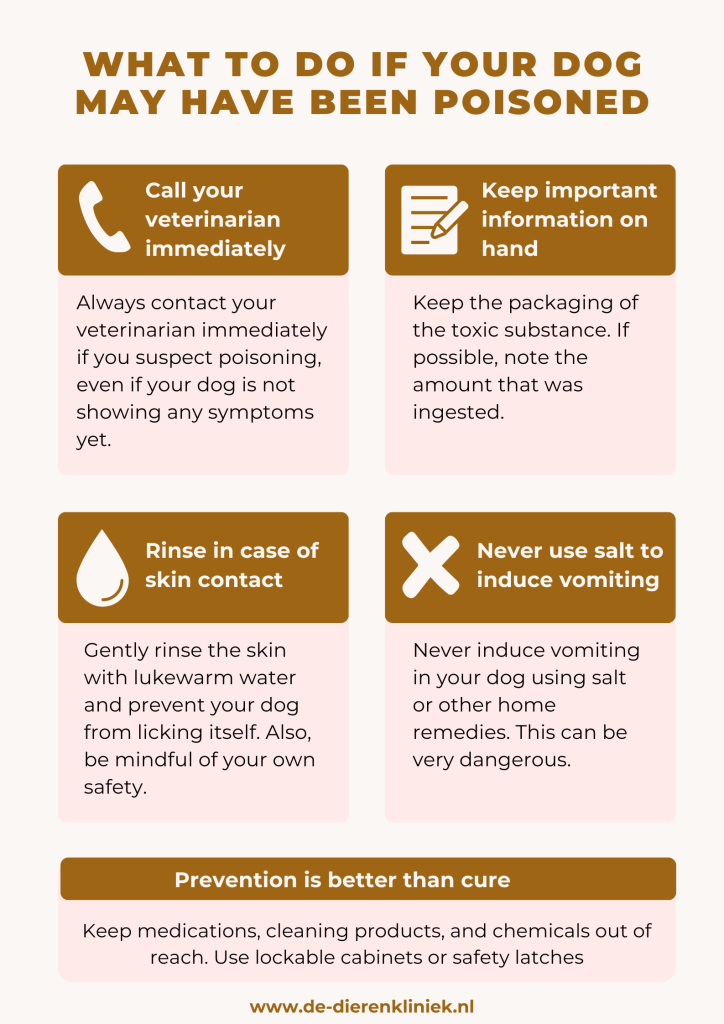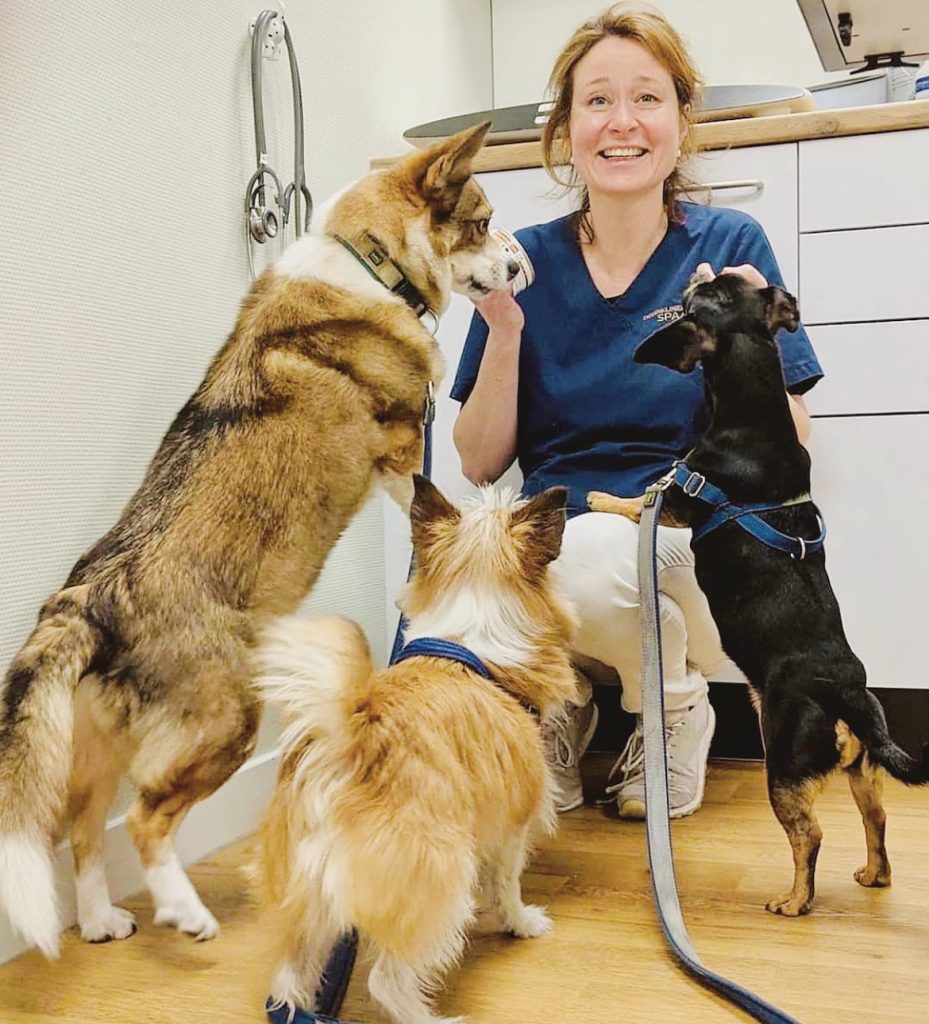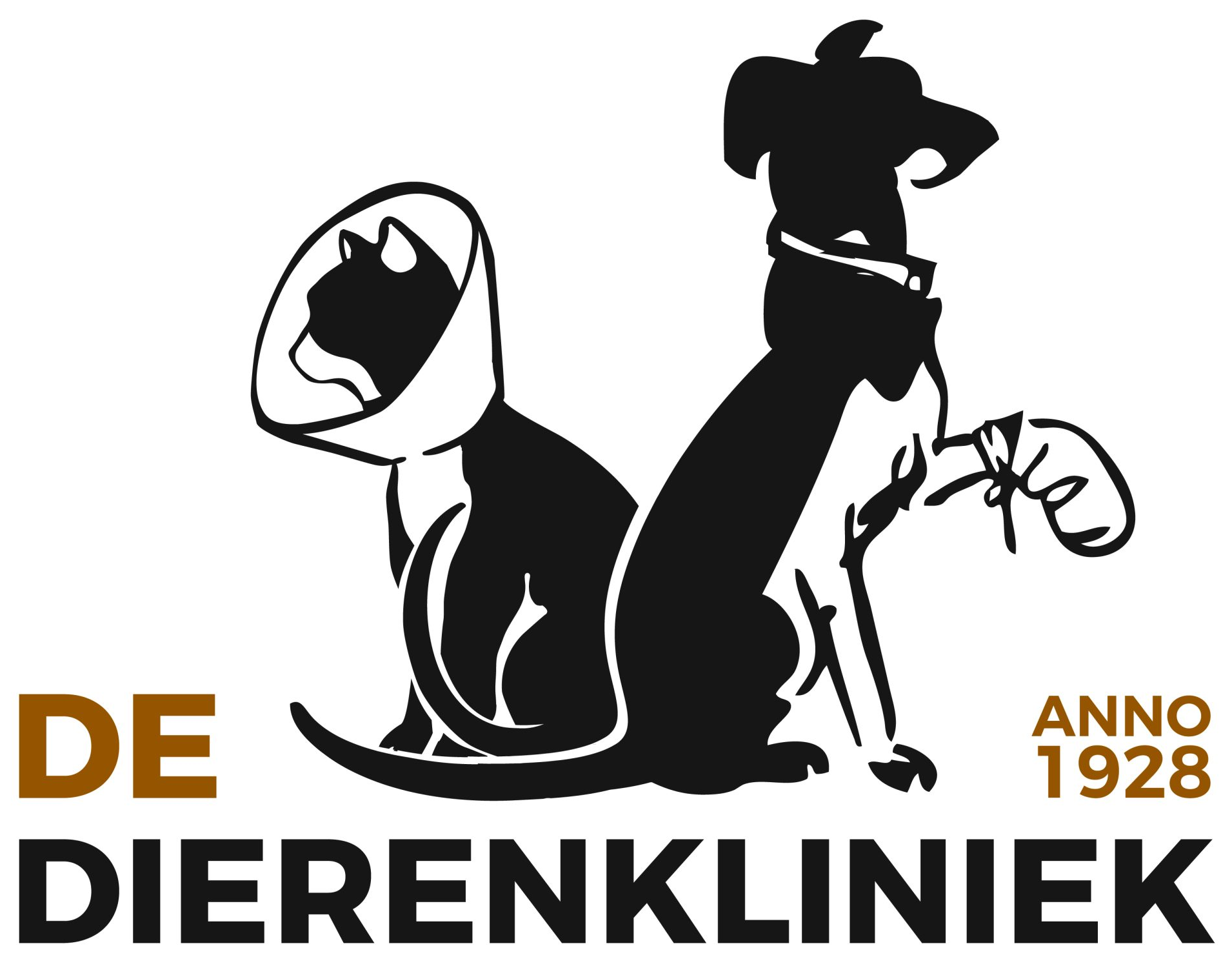Poisons in Dogs
Dogs are naturally curious and like to explore their surroundings, which sometimes leads them to ingest substances that can be harmful. When your dog eats or drinks something not intended for them, it can result in poisoning. Many common household and garden products pose a risk. It is therefore important to know how and through what a dog can be poisoned, and how to act if your dog ingests something toxic.
Different forms of poisoning

Your dog can be poisoned in several ways, namely:
- Direct contact through the skin
- Oral ingestion: your dog has eaten or licked something
- Inhalation: your dog has breathed something in
- Indirect contact: for example, something on their paws or fur that the dog then licks
What are the symptoms of poisoning in dogs?
Poisoning can cause various symptoms. Common symptoms are:
- Vomiting and diarrhea
- Bleeding
- Drinking and urinating a lot or not urinating at all
- Behavioral changes
- Palpitations
- Salivating/foaming at the mouth
- Abnormal breathing
How quickly does a dog develop symptoms after poisoning?
If your dog has been poisoned, symptoms may appear quite quickly after ingestion, but sometimes they may not become visible until several days later. This depends on the type of poisoning.
Do you suspect that your dog has been poisoned?

Suspect a poisoning? Always call a veterinarian for advice. Try to have the following information ready when you call. If your dog is registered with the veterinarian, their age and weight may be available in the medical record.
- Age of your dog
- Weight of your dog
- Name of the toxic substance
- Amount ingested
- Duration of contact (in case of skin/eye contact or inhalation)
- Time the exposure occurred
- Whether your dog is showing any symptoms of poisoning
- Whether you have already initiated any treatment
If you have the packaging of the substance involved, keep it handy and bring it with you to the veterinarian.
How is a poisoning diagnosed?
In most cases, it is known that the dog has ingested or come into contact with a substance that can cause poisoning. In such cases, a diagnosis is usually not necessary. However, it is important to determine which substance and how much of it your dog has ingested, so that the severity of the poisoning and the associated risks can be properly assessed.
If it is unclear whether your dog has been poisoned but it is showing corresponding symptoms, additional tests may be performed, such as a blood test. The type of blood test the veterinarian performs depends on the symptoms your dog is showing. Blood tests can help assess organ function, detect anemia, and identify the presence of certain toxins in the bloodstream.
Treatment for poisoning in your dog
In most cases of poisoning, it is important to induce vomiting as soon as possible after ingestion so that as much of the toxic substance as possible is removed from the body. Inducing vomiting is generally only effective within the first 4–6 hours after ingestion. For household products, veterinarians often choose not to induce vomiting due to the risk of foam formation during vomiting or additional irritation to the esophagus.
Important: Never use salt to make your dog vomit yourself! This can cause salt poisoning, which in some cases can be fatal.
In addition to inducing vomiting, other measures may be necessary in cases of poisoning. Additional treatments that may be performed include:
- Stomach flushing
- Intravenous fluids
- Administration of activated charcoal (Norit powder)
- Laxatives
- Administration of specific antidotes
- Treating symptoms
If your dog has come into contact with a toxic substance on the skin or in the eyes, rinse thoroughly with lukewarm water. Prevent your dog from licking itself (wrapping in a towel may help) and be mindful of your own safety.
Additional testing after poisoning
Some types of poisoning can cause damage to the organs. In such cases, blood tests will be performed, which may sometimes need to be repeated after a period of time, as changes in the body may only become apparent later.
What are the most common poisonings?
Pesticide poisoning
- Mouse and rat poison
- Snail poison
- Weed killer
Treatment: induce vomiting, gastric lavage, administer activated carbon and laxatives. If necessary, administer vitamin K. In some cases, a blood transfusion is needed.
Food poisoning
Much of the food meant for humans can be toxic to dogs, sush as:
- Chocolate
- Raisins/grapes/currants
- Avocado
- Onion/garlic/chives
- Macadamia nut
- Caffeine
- Xylitol (sugar substitute)
Treatment: induce vomiting, administer activated carbon and laxatives. In some cases, additional symptom control and support by means of an intravenous infusion are chosen. In the case of grapes, we also recommend a blood test and repeat this after 3 days.
Drug poisoning
- Ibuprofen
- Paracetamol
- Antidepressants
- Aspirin
Treatment: induce vomiting, administer activated carbon, laxatives, intravenous infusion and symptom control.
Poisoning by household products
- Antifreeze and coolant
- Cleaning products (especially those containing Phenol as an ingredient, e.g. Dettol))
- Mothballs
- Antifungal agents
Treatment: depending on the drug, induce vomiting, gastric lavage and administer activated carbon, laxatives, intravenous infusion, sedation, cooling.
Other causes of poisoning
- Drugs
- Blue-green algae
- Medicines for animals
- Plants and bulbs (the most common are lily, dieffenbachia, Christmas rose, poinsettia, dracaena, and many other houseplants. Also be aware of the irritating effects of giant hogweed.)
- Botulism
- Mushrooms
Treatment: induce vomiting, gastric lavage, laxatives, hospitalization and intravenous infusion, treatment with antidote.
Prognosis and Aftercare
Fortunately, by acting quickly, it can often be ensured that the animals do not suffer any lasting effects from poisoning. Aftercare is necessary for some poisonings. For example, there are certain poisonings that can cause damage to the organs. These changes can sometimes only be seen later. For this reason, you want to perform a blood test and repeat this after a few days.
If you have any further questions about this topic, please contact us!

Our clinics
Whether you come to Amsterdam or Heemstede, you will hardly notice the difference. The atmosphere is homely and warm and we welcome our clients and patients with a smile and lots of patience.
See our clinics here

